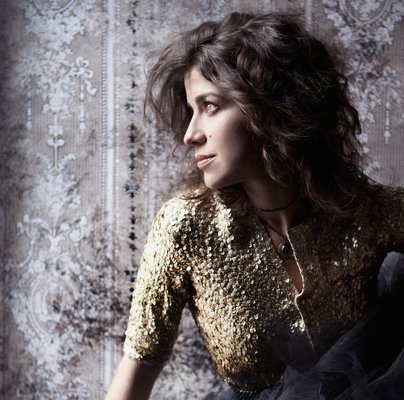
A classical pianist’s work is often very lonely, Inna Faliks says. It is not nearly as social as string orchestras, or even quartets, nor as open to variation without wearing the label of “avant-garde” for an audience that is succinctly niche.
Yet when the Ukrainian-born musician began melding her art with spoken word by both well-known and up-and-coming poets, she created her own form of expression that is not only original but also approachable.
Ms. Faliks calls it “Music/Words”—and she is the “Speaking Pianist,” as well as a professor and a mother.
“I don’t think so much about tradition anymore. I think of myself as a powerful pianist,” explains Ms. Faliks, who will return to the Parrish Art Museum in Water Mill on Friday to play a concert, as part of the Salon Series. “I don’t have any borders. There is nothing that I look at and say, ‘That’s too difficult.’”
Ms. Faliks began playing piano at age 5, which falls in line with many of her contemporaries, she says. “You won’t find many professional pianists starting after. I grew up in the former Soviet Union, where the notion of discipline was quite a bit different. When you exhibit signs of talent from an early age—my mom was a pianist, so I was basically geared up for a life in music from the start. I just never looked the other way. It is an enormous amount of discipline.”
She immigrated to the United States in 1989 as a child. “I did tour Russia, but I’ve never been back to the Ukraine,” she said. “That remains on the to-do list.”
By age 15, the pianist had made her professional debut with the Chicago Symphony Orchestra, and would go on to play Carnegie Hall, the Metropolitan Museum of Art, Salle Cortot in Paris, Tchaikovsky Hall in Moscow, and music festivals around the world. She recently took the stage alongside “Downton Abbey” star Lesley Nicol in “Admission: One Shilling,” a play for pianist and actor about the life of British pianist Dame Myra Hess.
On Friday, she will perform Brazilian jazz composer Clarice Assad’s “Godai: the Five Elements,” which incorporates five movements based on Japanese Buddhism involving the elements—“Dry Bones” for wind; “Absense” for fire and water; “Gravity” for earth; and “Ascension-Azure” for sky—with poetry, humming and sound effects by Steven Schroeder.
“I’m very excited to be back. I absolutely love this venue—the Parrish Art Museum. It’s magical,” she said. “It’s perfect for sharing with an audience, for drawing the audience in. I’m very grateful to be a part of it again.”
“Music/Words” is a true collaboration between artists, according to Ms. Faliks, who starts it off by sending a poet a piece of music. She then suggests places where they could read poetry—for example, before the first movement, between the second and third movements, but never while she is playing.
The process and, ultimately, the sound are very intuitive. The spoken word should guide the mood, in relation to the composition, and blends into the music—giving each verse a parallel existence and asking the audience to listen to it the same way they would digest music, she said.
“I’m very interested in the crossing of genres,” Ms. Faliks said. “The two times I’ve worked in theater productions was very interesting, because it was the first time I got to work with actors. It was very unusual and not something that most classical musicians are accustomed to doing. So it was just fascinating to see the similarities with acting a theater piece.
“Both times were pieces that were for a monologue for a pianist and an actor,” she continued. “The second time was based on my memoir, which is unpublished as of yet. That was in Los Angeles. Reading through the piece, the director would bring to life the smallest details that give life to a performance. So it’s not just sounds, but to something three-dimensional. It involves moving the audience. Whether it’s the music or the words, it’s all an art form.”
She passes that message on to her piano students at UCLA—and, perhaps, to her two young children someday.
“It’s difficult to balance, but if you have a lot of passion, energy and great support with a lot of love in your life, the more you can accomplish,” she said of her jugging act. “Time can be malleable. You’ll find time to do it. For me, I never compromise quality for time, so I draw a line to accomplish that.”
Pianist Inna Faliks will play a concert, with poetry by Steven Schroeder, on Friday, October 23, at 6 p.m. at the Parrish Art Museum in Water Mill, as part of the Salon Series. Tickets are $20, or $10 for members. For more information, call (631) 283-2118, or visit parrishart.org.
The classical musician will play a second concert alongside poet L.B. Thompson on Saturday, October 24, at 5 p.m. at St. Luke’s Episcopal Church in East Hampton, as part of the Music at St. Luke’s concert series. Tickets are $20 and free for children. Refreshments will be served following the performance. For more information, call (631) 329-0900, or visit musicatstlukes.org.